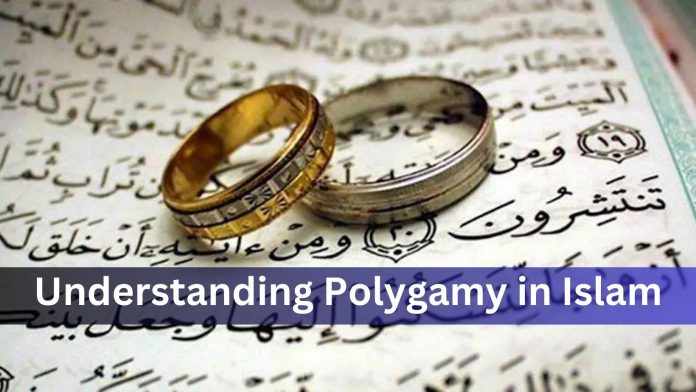Polygamy, the practice of marrying multiple spouses, is often a subject of debate and misunderstanding in both Muslim and non-Muslim societies. While it is a permitted practice in Islam, it is also heavily regulated and comes with stringent conditions. This article explores the Islamic perspective on polygamy, supported by references from the Qur’an and Hadith, and places the practice in its historical context, where polygamy was not only common but also considered a norm among many societies, including the prophets mentioned in the Bible.
The Qur’anic Basis for Polygamy
The primary verse in the Qur’an that permits polygamy is found in Surah An-Nisaa:
“And if you fear that you will not deal justly with the orphan girls, then marry those that please you of [other] women, two or three or four. But if you fear that you will not be just, then [marry only] one or those your right hand possesses. That is more suitable that you may not incline [to injustice].” (Qur’an 4:3).
Support Our Work
If you like the Islamic articles on this website, please help us by supporting us with a donation starting from $1, so that we can continue to write more Islamic articles.
This verse is clear that polygamy is allowed in Islam, but it is not an obligation. Instead, it is a concession given under specific circumstances. The key condition laid out is the ability to be just among the wives. If a man fears he cannot fulfill this requirement, the Qur’an advises that he should marry only one.
The Prophet Muhammad’s Example
The Prophet Muhammad’s own practice of polygamy is often cited as a model for Muslims. However, it is important to note that his marriages had specific social and political purposes, such as solidifying alliances and providing protection to widows. Despite being allowed multiple wives, the Prophet Muhammad emphasized the importance of justice and fairness in treatment, which is a core requirement in polygamy.
In the Hadith, the Prophet is reported to have said: “Whoever has two wives and leans towards one of them [more than the other], he will come on the Day of Resurrection with a side hanging down” (Abu Dawood, Tirmidhi). This underscores the importance of equal treatment in polygamous marriages.
Polygamy in Historical Context
Polygamy was a widespread practice long before the advent of Islam. Many of the prophets mentioned in the Bible, such as Solomon (Sulaiman) and David (Dawud), had multiple wives. Solomon is noted to have had hundreds of wives and concubines, which was not unusual for kings and leaders at the time. This historical context shows that polygamy was not a concept introduced by Islam, but rather a practice that Islam sought to regulate and bring within ethical boundaries.
Support Our Work
If you like the Islamic articles on this website, please help us by supporting us with a donation starting from $1, so that we can continue to write more Islamic articles.
In many ancient societies, polygamy was a practical solution to various social issues. For instance, during times of war, when many men were killed, polygamy ensured that widows and orphans were cared for. It also helped increase the population in societies where survival and expansion were paramount.
The Wisdom Behind Polygamy in Islam
Islam’s regulation of polygamy is seen as part of the broader divine wisdom that seeks to ensure justice, social stability, and moral integrity. By limiting the number of wives to four and stressing the need for justice, Islam mitigates potential abuses that could arise from the practice. The restriction to four wives was itself a progressive step, given that before Islam, men could marry an unlimited number of women.
Additionally, polygamy in Islam is not obligatory but permissible under certain conditions. It is viewed as a practical solution to specific social issues, such as caring for orphans and widows, ensuring the well-being of women, and addressing the imbalance in the number of men and women in certain circumstances. These considerations reflect Islam’s emphasis on social justice and the protection of vulnerable individuals in societ.
Misconceptions and Modern Perspectives
One common misconception is that Islam encourages polygamy as a norm, while in reality, it is presented as an exception rather than the rule. Many scholars, including those from the Shafi’i school of thought, recommend monogamy unless there is a compelling reason for polygamy. This is based on the understanding that maintaining justice among multiple wives is extremely challenging, and the potential for harm and injustice is significant.
Support Our Work
If you like the Islamic articles on this website, please help us by supporting us with a donation starting from $1, so that we can continue to write more Islamic articles.
In contemporary times, polygamy is often viewed with skepticism, particularly in Western societies where monogamy is the norm. However, it is important to approach the practice within its historical and religious context. In Islam, polygamy is not about male dominance or exploitation, but about providing solutions to specific social needs and ensuring that women are cared for and protected.
Conclusion
Polygamy in Islam is a complex issue that must be understood within the framework of Islamic law and the historical context in which it was practiced. It is permitted but heavily regulated, with the primary concern being justice and fairness. The Qur’an and Hadith provide clear guidelines that ensure the practice is conducted ethically and justly.
Historically, polygamy was a common practice among many cultures and was not unique to Islam. The Islamic regulation of polygamy brought ethical standards to a widespread social practice, reflecting the religion’s broader commitment to justice and social welfare. Understanding these nuances helps dispel common misconceptions and provides a more accurate picture of what polygamy represents in Islam.
Help us continue to create useful articles like the ones on this page
Every donation you make will go a long way in enabling us to continue writing on this page. Even a 1 dollar donation will help.




